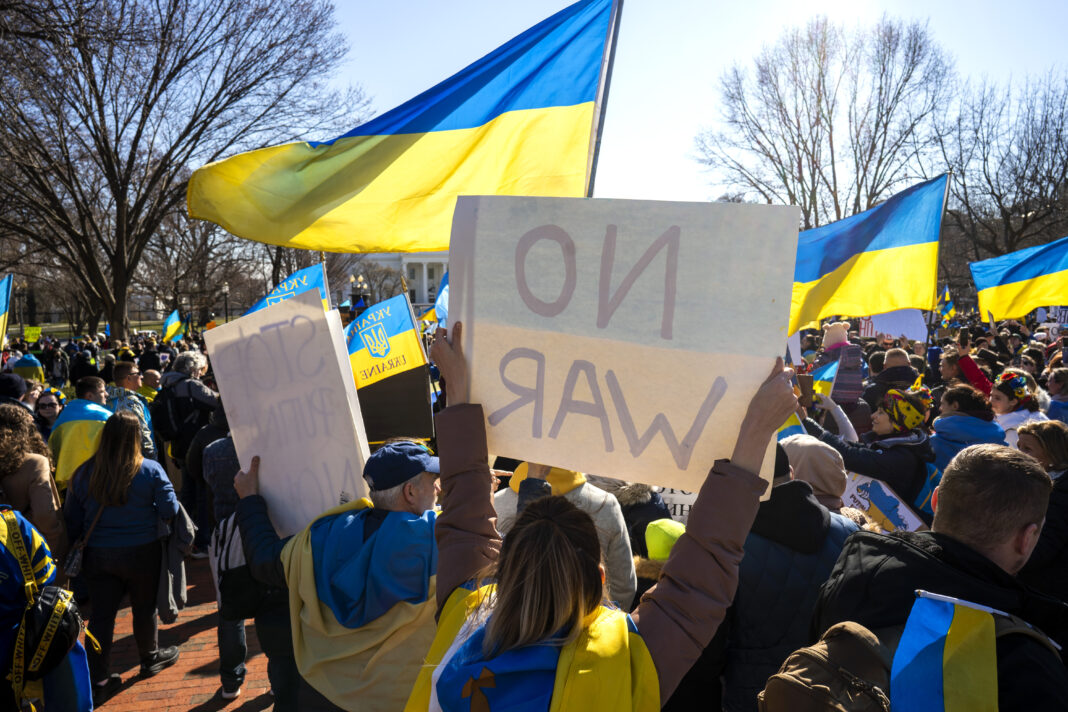the weekly editorial by our director, italian journalist Raffaele Crocco.

One year later, Ukraine is still at war. Recalling these 365 days since the insane and unacceptable Russian aggression against Ukraine forces us to line up a few thoughts. Many have already been written in the commentary on these long months of death and destruction, but repeating them is useful to understand where we are all heading, no one excluded. Let’s illustrate some.
The price of this war will be paid by our children and grandchildren, in a much more onerous way than we can imagine. They will pay it in terms of increasing arid lands, in terms of the absence of water, in terms of coastlines eroded by rising seas, in terms of ever warmer temperatures. The war in Ukraine, with its year of fighting and the world’s simultaneous, maddening fear of running out of gas and oil, has buried for good the hope of containing climate change. We will not be able to keep it below the threshold of +1.50° degrees of average increase, and that means only one thing: disaster. Better prepare a survival plan B, because our species risks extinction.
“The war in Ukraine, with its year of fighting and the world’s simultaneous, maddening fear of running out of gas and oil, has buried for good the hope of containing climate change.”
The World as we knew it no longer exists. This war is redrawing the boundaries of the areas of interest and influence of the great and medium-sized powers, redefining trade routes, alliances and cultural patterns. Ruling the planet is the Asian axis, which has China as its driving force. The meeting in recent days between the governments of Moscow and Beijing has reaffirmed China’s absolute intention to keep Russia tied to a far-reaching political-military project. The United States’ response is in the revival – accepted out of weakness and convenience by the European Union – of NATO as a military organisation of deterrence and threat. The redefinition of areas and roles has dealt a definitive blow to the instrument that for two decades seemed successful and innovative in international relations: cooperation. Today, confrontation has reverted to the ‘imperial’ type, based on force and peripheral, delegated confrontation. Ukraine is the most dramatic example of this.
The redefinition of fields of interest and alliances has had, as a further consequence, the disappearance of ‘third agents’, i.e. countries capable – in situations of this kind – of presenting themselves as objective and uninteresting negotiators. Today, there is no one who can think of mediating between Russia and Ukraine. Everyone is in some way involved and has specific interests. At the same time, the UN – which according to its charter and statute would be the place to mediate – has no useful and serious instrument to try to put an end not only to this tragic war, but to the too many, more than 30, that are being fought at the same time in the world. The only sensible thing to do would be to start reforming the United Nations, making it a fixed point in the government programmes of countries that call themselves ‘democratic and guardians of human rights’.
The analysis we give of this war, day after day, shows that we are anchored in nineteenth-century patterns, those that put the ‘interests of the state and the system’ before everything else. If we were to look at this war – and all the others – by opening a different window on the World, we would be able to find tools for both prevention and peace-building. We must replace the vision of geopolitics with the vision of the geography of human rights, reading with that grid – right to work, individual and collective freedoms, health, education – what is happening and what choices to make in international relations. This would not avoid confrontation in the short term, but it would change the rules of the game – I am thinking of the regime of foreign investment, of trade – in the medium to long term. We have demonstrated this with this war: we had eight years to try to avoid it. We did not want to, we were not interested in doing so. It was geopolitically more interesting to continue doing business with Putin and Kyiv, imagining that everyone’s interest was our own: to avoid raising the level of the war that was already underway.
This is what we face today, 24 February 2023, exactly one year after the Russian invasion of Ukraine. We have a bleak picture, painted with several hundred thousand dead soldiers and civilians, with cities and structures destroyed, with 7 million people on the run. We have, above all, the certainty that continuing the arms race only serves to prolong a war with no winners on the ground and that, under these conditions, cannot have winners even at the negotiating table. We are choking ourselves and, with us, we are choking the Planet, without finding answers capable of preventing people from continuing to die in Ukraine.
Cover image: Mike Maguire, Flickr, February 2022 – all credits to the author.
























